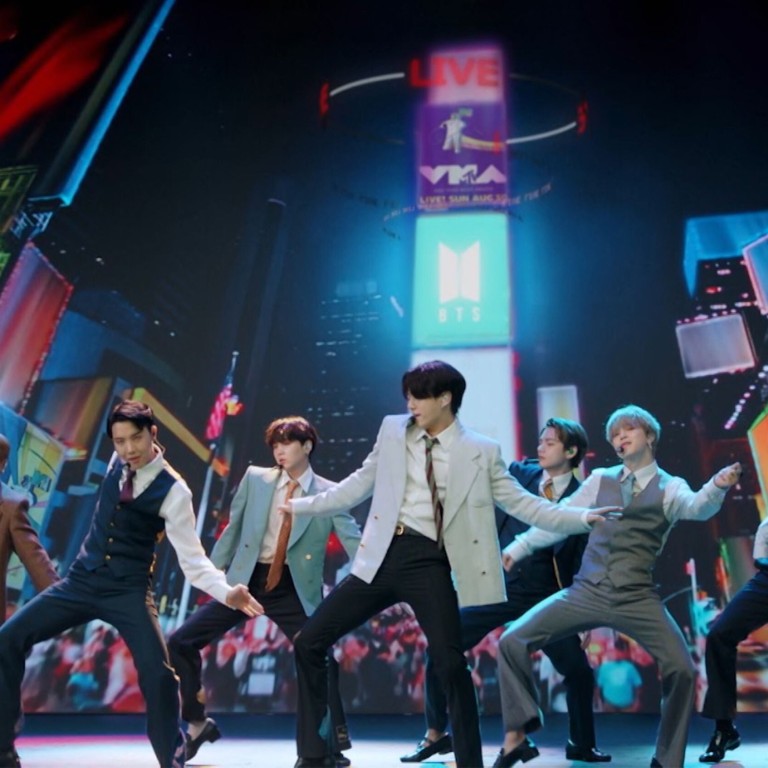
Dynamite and an ARMY: how K-pop’s BTS invaded the US billboard charts
- RM, V, J-Hope, Jungkook, Suga, Jin and Jimin belong to no ordinary boy band, but a multibillion-dollar enterprise making up a chunk of South Korea’s GDP
- While their success has only recently been recognised overseas, it has been a long-time coming and owes much to savvy marketing and fan engagement
The firm’s CEO Bang Si-hyuk is to offer his superstar group just over US$54 million in shares to strengthen their “long-term partnership” and “boost morale”, according to industry reports this week.
How fans come to terms with K-pop deaths of Goo Hara, Sulli and Jonghyun
Yet for all the band’s success – and its immense global fan base called ARMY – it is only recently, and particularly since Dynamite debuted at No. 1 on the US billboard 100 chart in late August, that overseas critics and institutions have begun to sit up and take notice.
For K-pop fans and industry experts who’ve been watching the group’s monumental rise, the band’s tremendous global success is not down to chance. Rather, it has been in the making since the group’s 2013 debut and owes much to savvy marketing and fan engagement.
“The heart of BTS’s success is the talent and charisma of the members presented to global audiences through abundant and frequent online interactions between BTS and ARMY,” says CedarBough Saeji, a Korea scholar and visiting assistant professor at Indiana University, Bloomington. “ARMY has truly responded to the members and lifted them up – refusing to bow to gatekeepers and continually promoting the group in small and large ways.”
According to Saeji, the group’s timing – debuting at a time when many audiences were being exposed to Korean products including K-dramas, K-beauty, Korean cinema and K-pop – was also key.
CHAMPIONS OF SOCIAL JUSTICE
“I think this was important because it attracted fans to more than just a musical product, but a social movement with a message,” says Saeji.
Jenna Gibson, a K-pop writer and PhD candidate at the University of Chicago, agrees that ARMY is a product of their messages and morals as well. “This loyal fan base didn’t come from nowhere, BTS have continued to gain fans because there is something that resonates with people – whether it’s the messages in their songs, their teamwork, or their artistry,” she says.
“I grew up in America, I know and have felt anti-Asian sentiment all the time. We are under-represented in the media, and a lot of times it paints Asians as uncool,” says Chun. “BTS has become a household name but how many actually know their songs and appreciate their music?
“It’s really just unfortunate that so many are closed off to K-pop and not respectful of Asians.”
Why BTS Army and other K-pop fans are aiming their activism at Donald Trump
SAVVY STRATEGIES
In August, BTS performed Dynamite, their latest chart-topping single, live for the first time at the 2020 MTV Music Video Awards (VMA); during the event they also won four VMAs including Best for K-pop and Best Group – awards they received for the first time in 2019.
Dynamite was recorded in English only because BTS felt the original demo sounded better in the language, says Saeji. The difference with other K-pop artists who have tried this in the past is that BTS “had already broken into the English speaking market before releasing it”.
In the past, other Korean artists made a play for the US market seemingly overnight, “dropping an English version of one of their songs, doing a collaboration or two with an American artist, and kind of expecting it to take off from there automatically,” says Jenna Gibson, the University of Chicago scholar.
“I think the assumption was, in part, that because they were so popular elsewhere, American audiences just needed to see how talented they are and they would be on board – of course, success is far more complicated than that,” she says.
Industry watchers like Gibson say it’s only a matter of time until other K-pop groups evolve, grow and gain mainstream success in the US and global markets. “Blackpink is [already] extremely successful. I think more groups like Twice, EXO, Stray Kids, Txt, and Itzy will gain a lot more popularity.”
For Chun, the global success of K-pop and BTS is a matter of celebrating diversity, which the US needs to recognise. “We still have a way to go and hopefully younger generations can lead the future,” he says. “We need to change [perceptions of ethnic minorities] and we need to speak up. There are so many dope Asians in music, fashion, film and entertainment.”

